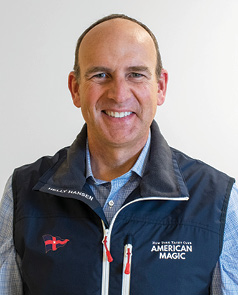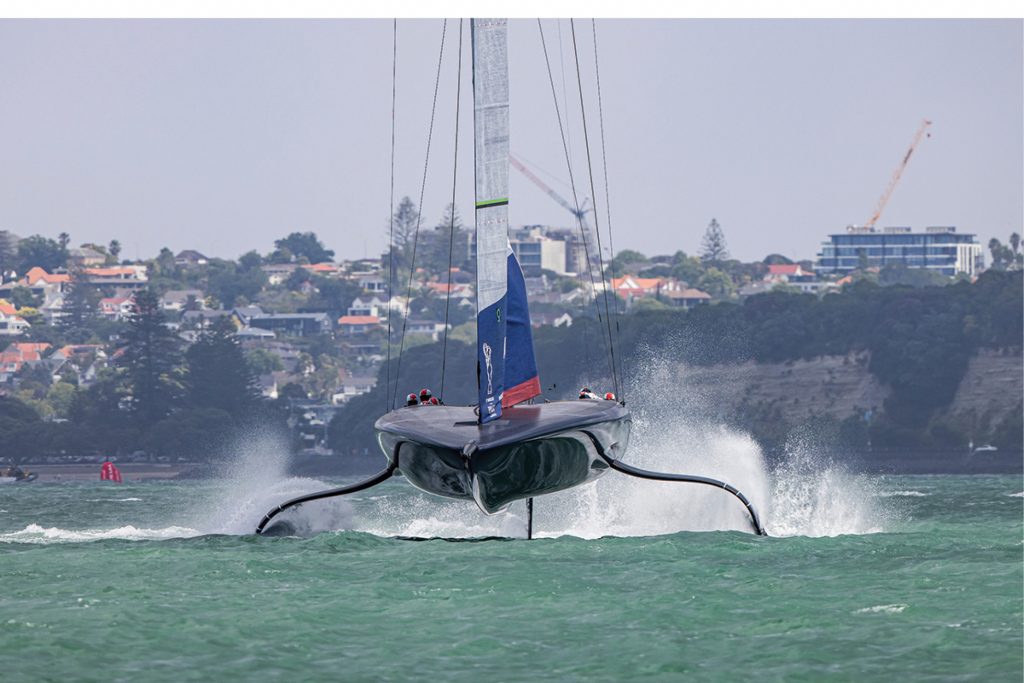
Doug DeVos © Amory Ross/American Magic
For Doug DeVos, sailing has always been a family affair. It has also been a never-ending quest to expand the sport through various “big boat” one-design concepts. A founder, stakeholder and leading light of the 52 Super Series, Doug has led Quantum Racing to four championships.
Now, he has joined Roger Penske and Hap Fauth as Principals of New York Yacht Club American Magic in a quest to bring back the ultimate, unifying “tool” to American sailing. As this issue went to press, American Magic was contesting the PRADA Cup Challenger Selection Series, the winner of which will take on Emirates Team New Zealand in the 36th America’s Cup Match presented by PRADA in March.
WindCheck: Thank very much for doing this, Doug. Where did you grow up, and how old were you when you started sailing?
Doug DeVos: It’s my pleasure! I honestly can’t remember when I started sailing. It would have been cruising on the Great Lakes with my parents. Dad had a 40-foot wooden cruising boat and then a Columbia 50, circa 1967. I’m the youngest of three brothers, and Dad stopped cruising when they got into high school and convinced him to move into racing. I would have been around 10 years old when I was introduced to racing with my older brothers Dick and Dan with our Dad in mid-‘70s and the rest is history, from IOR 50s on through the IMS 70 in the early ‘90s.
WC: Please tell us about your significant sailing mentors, and the most important things you learned from them.
DD: Well, Dad would be number one. Then in 1982, Lowell North sailed with us on the Mac. That was an amazing eye opener. He was so active, all around the boat, tweaking and looking at every angle. He was quiet, but intense and non-stop. That really opened my eyes and made me see the sport differently.
We had so many great sailors sail with Dad and my brothers and the sportsmanship that we valued always seemed reflected in who was on our team: John Bertrand, John Kolius, and Buddy Melges. Wow, Buddy is just an unbelievable person beyond being a sailing legend. I also need to say that I learned so much from our local competitors and friends. Growing up in Michigan there was just a great collection of families who did things the right way. They competed very hard and well but were great friends, too.

New York Yacht Club American Magic’s AC75 Patriot is pictured in the PRADA Christmas Race, a preliminary event for the 36th America’s Cup presented by PRADA, which will be held March 6-15 in Auckland, New Zealand. © Jesus Renedo/Sailing Energy/American Magic
WC: Please describe the keys to Quantum Racing’s success, and the ways in which you’ve brought that culture of winning to American Magic.
DD: The key is Terry Hutchinson. He joined us after the 2007 Cup and he brought his intensity, his professionalism and his commitment to winning. And he came with his longtime mentor Ed Reynolds. And then there’s Mark Koetje, who came to us initially as just a friend of my brother Dan. But he became the campaign manager and he really laid the groundwork for 2008 and beyond.
WC: How many Quantum Racing team members are on the American Magic roster?
DD: There’s Terry, of course, who also works with Hap, and Rob Ouellette who manages Hap’s programs. That was the genesis of this team when we had a call to discuss whether we really share the same values and we were immediately very comfortable. There is so much cross-pollination of talent like Matt Cassidy, Sean Clarkson and James Lyne.
WC: What inspired you to challenge for the America’s Cup?
DD: In 1983, probably the most important thing in my life was football. But I’ll never forget being late for practice watching the America’s Cup on fledgling ESPN. The significance of that legacy of the oldest trophy in sport showed me that it can really benefit sailing – that it can be a positive influence on the sport. And that’s what I love…brings me back to the Midwest approach to sportsmanship and the passion people have for the sport. I just love the team working together on the shared passion, people busting out of work to go put things together to go sailing. I have been involved with so many of these classes where we try to recreate that equal playing field and competition.
WC: Please tell us about teaming up with Phil Lotz and Roger Penske.
DD: I had gotten to know Phil a little bit though Melges 32s, which is another great, fun class, so when I got the email from Phil, then Commodore of the NYYC, it was quite impactful. Phil has a way of building relationships, very thoughtful and genuine.
Then there’s Roger Penske. Going into that first meeting, I wasn’t sure what to expect. Roger was very contrite. He said, “I don’t know a lot about sailing.” I said, “But you know a lot about racing – a lot about how to win!”
We are so lucky to have Roger. When it comes to building a team, his philosophy of teamwork, you can’t help but be overwhelmed by his approach and his insights. The questions he asks are so revealing. He knows A LOT about so many aspects. We feel very privileged to be a part of this and to have had a chance to meet some really wonderful people. I would not have had the opportunity to build and develop this team, so hopefully that opportunity will continue.
WC: With a very strong Kiwi team defending in their home waters and an as yet untested Class Rule, this might be toughest regatta in America’s Cup history. What’ll it take to win?
DD: First, we have to deal with two other teams. The Italians and the Brits have tremendous talent. It is going to take us to be our best, and like any sport, we are going to need a break here or there. We will need to mitigate risk, jump on opportunity, and be totally prepared to do that. We have to have a plan for every move, on and off the water. You can never have enough time, and preparation, just like in football, is critical. To succeed, you have to have a good week of practice…not just during game day.
As always, the fastest boat is going to win. But it has to be ready to be the fastest in all conditions, and to stay out on the water to finish the job. It’s a very complicated sport, as we all know.
WC: What’s your advice for young sailors aspiring to race for the America’s Cup?
DD: Get on the water everywhere you can. Find those people who are willing to invest in you and be willing to do whatever it takes. It may not be a clear path to an AC campaign, but focus on building your resumé. You have to understand that it is such a team effort; it is not a solo sport! Especially at this level, even if you are solo, the teamwork skills are totally key. Your ability to learn from the other people at the table will be essential in anything you do in life.
WC: Thank you very much Doug. We’re already looking forward to the 37th America’s Cup…in Newport!
Special thanks to New York Yacht Club American Magic Communications Director Will Ricketson for facilitating this interview. ■




